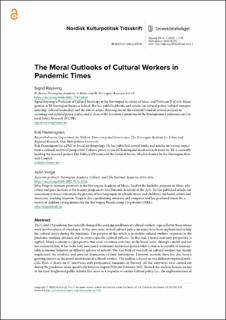The moral outlooks of cultural workers in pandemic times
Peer reviewed, Journal article
Published version
Permanent lenke
https://hdl.handle.net/11250/3049210Utgivelsesdato
2022Metadata
Vis full innførselSamlinger
- Scientific articles [2181]
Sammendrag
The Covid-19 pandemic has radically changed the working conditions of cultural workers, especially for those whose work involves physical attendance. At the same time, several cultural policy measures have been implemented to help the cultural sector during the pandemic. The purpose of this article is to analyze cultural workers’ responses to the pandemic working situation and to corona-specific cultural policies. To this end, a moral economy perspective is applied. Moral economy is a perspective that views economic activities, in the broad sense, through a moral and not just a material lens. It has to do with how moral sentiments and norms govern what is seen as acceptable or unacceptable economic behavior in different spheres of activity. The vast bulk of research on cultural workers has mainly emphasized the symbolic and material dimensions of their motivations. However, recently there has also been a growing interest in the moral motivations of cultural workers. The analysis is based on two different empirical materials. First, it draws on 57 interviews with professional musicians in Norway. All the interviews were carried out during the pandemic, more specifically between August 2020 and February 2021. Second, the analysis focuses on one of the most heightened public debates that arose as a response to corona cultural policy (i.e., the implementation of a stimulation scheme for the cultural sector). The article concludes that the pandemic has revealed the presence of two conflicting moral outlooks in the understanding of cultural workers and cultural policy.

